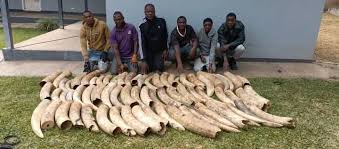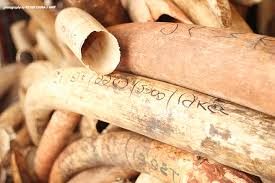
Six men including a Congolese suspected to be the Ivory trafficking kingpin, paraded after a raid that led to their arrest in Lusaka Zambia.
John Cassim
Zambia’s Ministry of Tourism, through its Department of National Parks and Wildlife (DNPW), has nabbed a Congolese suspected to be the ivory trafficking kingpin in the country. Five accomplices were also arrested in a sting operation conducted, on April 13, 2025, in Lusaka.
This operation was carried out in the outskirts of Lusaka as a result of credible whistleblowers who raised concern over wildlife trafficking.
During the raid, DNPW officers from the Intelligence and Investigations Unit intercepted a silver Toyota Quantum Hiace minibus, registration number BAZ 6727 ZM, which was found loaded with elephant ivory weighing 528.8 kilograms, an alarming amount that highlights the scale of the illicit trade.
The officers recovered 72 pieces of elephant ivory packed in 20 sacks which they confiscated.
According to the DNPW the milestone operation reflects Zambia’s strong stance against wildlife crime and its commitment to the protection of endangered species such as elephants.
“This interception sends a clear message that Zambia is not a safe haven for wildlife criminals. We remain vigilant and steadfast in our mission to dismantle illegal wildlife trafficking networks. The collaboration between the public, law enforcement and conservation stakeholders is critical and we thank all those who played a role in this successful operation,” DNPW Director Dominic Chiinda said.
Meanwhile the six suspects are being charged for contravening the Wildlife Act No. 14 of 2015, that of hunting or dealing with elephant or rhinoceros – Section 127 (1)(a)(b), (2)(a)(b). Unlawful possession of a prescribed trophy – Section 130 (1)(2) as read with Section 87 (4).
The Ministry has encouraged the public to continue reporting suspicious activities and pledged to protect Zambia’s precious natural heritage and cautioned that Illegal dealing in wildlife products is a serious crime.

Meanwhile the recent arrests in Zambia comes at a time when anti-poaching gains from the southern African region were noted at the 78th meeting of the Standing Committee of the Convention on International Trade in Endangered Species of Wild Fauna and Flora (CITES).
The meeting that was held in Geneva from 3-8 February 2025, also heard of the gains made in the regional fight against rhino killing and trade.
Two weeks before the meeting, South Africa was applauded after a 51-year-old Congolese rhino poacher and money launderer was slapped with an 18-year prison sentence.
He was jointly charged with 15 others and they all admitted to bribing Kruger National Park rangers to obtain inside information before executing their plan.
Botswana is also celebrating a significant reduction in rhino killings. Information provided to CITES shows that no rhino was poached in the country during 2024, up to 29 October 2024. This follows the implementation of a key 2023-2028 National Anti-Poaching Strategies Plan (NAPS), which was developed based on the 2022 CITES meeting.
Although the rhino horn trade and trafficking remains a significant concern between South Africa and Vietnam, where demand for rhino horn is believed to persist due to ritual beliefs, the SADC country reported a reduction in poaching incidents.
They attributed the reduction to the dehorning of rhinos populations in KwaZulu-Natal, specifically in Hluhluwe iMfolozi Park, where over 1,000 rhinos were dehorned since April 2024
